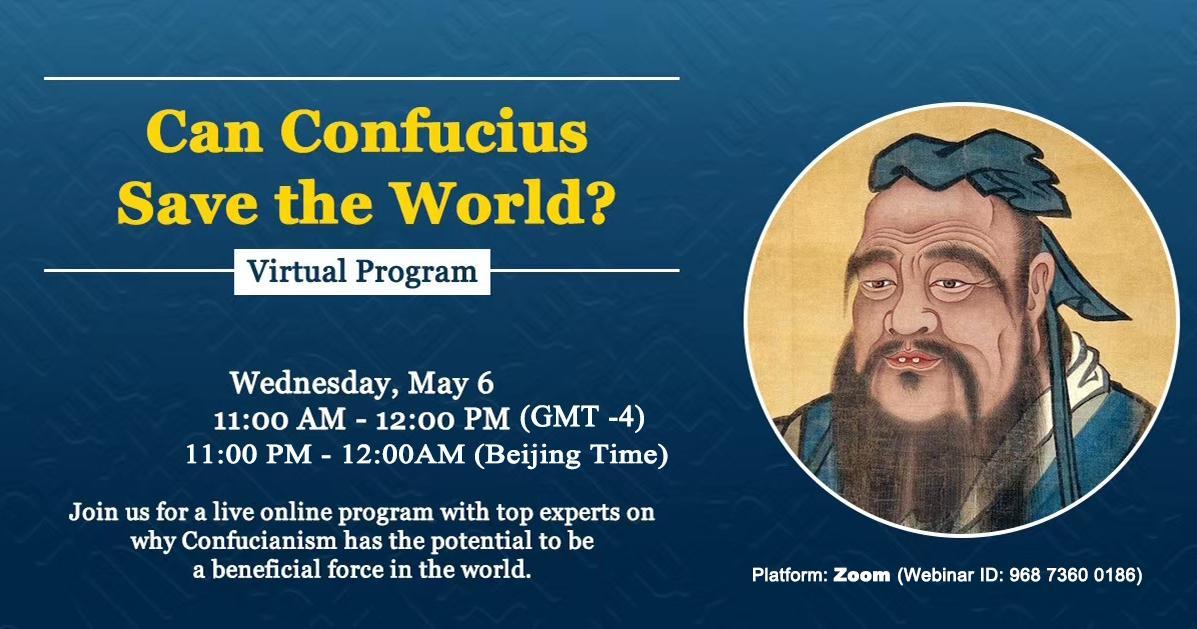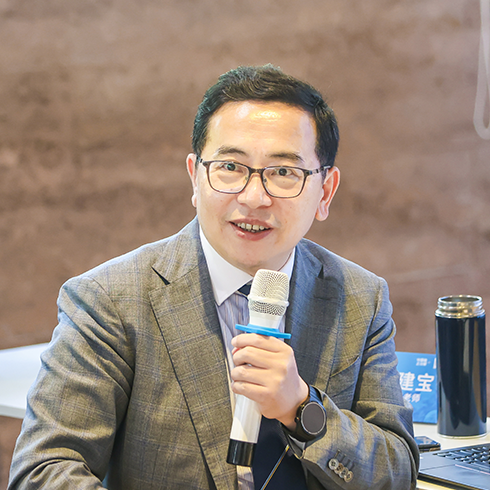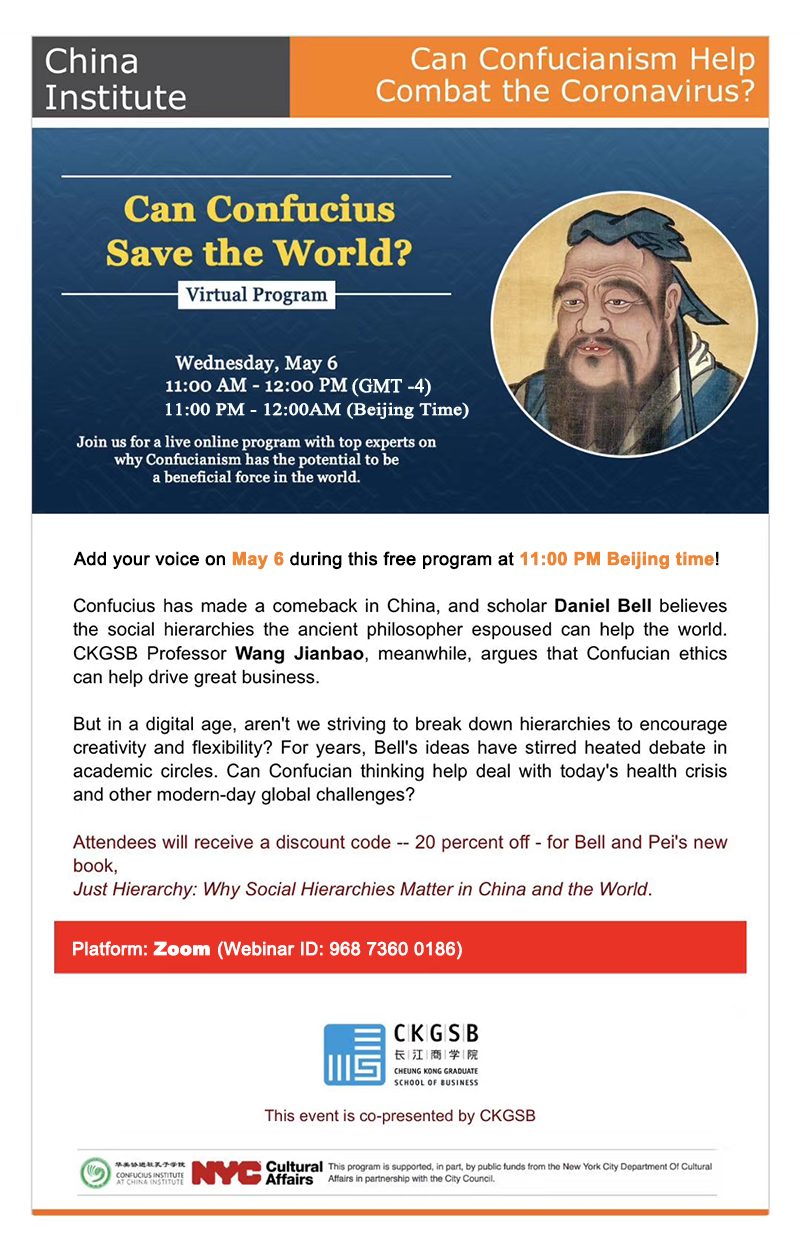
Confucius has made a comeback in China, and, scholar Daniel Bell believes it has the potential to be a beneficial force in the rest of the world. Bell’s writing on what he describes as China’s meritocracy has stirred heated debate among academic circles. Drawing on a new book Just Hierarchy: Why Social Hierarchies Matter in China and the World, Bell and WANG Pei argue that Confucius-inspired hierarchies can help deal with the ongoing health crisis and other modern global challenges. CKGSB Professor Wang Jianbao, meanwhile, argues that Confucian ethics can help drive great business.
Attendees will receive a discount code for 20 percent off Bell and Wang’s new book Just Hierarchy: Why Social Hierarchies Matter in China and the World.

Jianbao Wang is the Director of the Center for the Humanities and Business Ethics at Cheung Kong Graduate School of Business (CKGSB), starting in 2017. He is also a Research Fellow at CKGSB and Associate Researcher at Peking University.
He is currently serving as a Reviewer for Journal of Business Ethics, a member of A History of Chinese Philosophy, the Deputy General Secretary of Rushang(Confucian Entrepreneurship) Committee of China Confucius Foundation, the Director of Association for Confucianism Studies Shanghai, as well as the Director of Program for the Discourse on Confucian Entrepreneurs at World Ethics Institute Beijing.
His research focuses on Confucianism as well as developing new business models. Most of his research papers and articles were published in Chuanshan Journal (CSSCI), Legein Society, Financial Times Chinese Edition, Global Times, Caijing, and People’s Daily. His article, On Shengyi (Business), was accepted by the 24th WCP and was published in the book Humanistic Spirit in the Third Age of Confucianism: Essays in Honor of Tu Weiming’s 80th Birthday.
With his expertise in the areas of philosophy and business, Dr. Wang is the leader of curriculum design for Humanities and Business Ethics. His courses include The First Class on Humanities, Who’s Confucian Entrepreneurs and What Can Confucian Entrepreneurs Do, Entrepreneurial Spirit, New Era, New Business, New Civilization, Cultural Identity and Dialogues among Civilizations, On Business: Belief, Behaviour and Business etc.
In addition, he was invited to present at UNRISD, CLP, Moutai Group, CEEC, China Institute, Georgetown University, German Confucianism Association, Peking University, China Northwest University, Fudan University, Renming University, University Duisburg-Essen, Shanghai University of Finance and Economics, Tuebingen University, and Songshan Forum.
Prior to joining CKGSB, Dr. Wang had a long career in corporate group management, public company management, and supply chain management. He was the Chief Representative at Pakistan Railway (1999-2000). He also successfully built a National R&D Center (2011).
Dr. Wang received his baccalaureate degree in mechanical engineering from Xian Jiao Tong University, EMBA from Cheung Kong Graduate School of Business, and his doctoral degree in Philosophy from Peking University. His dissertation, Wealth and the Way: A Mencian Perspective, is pioneered in understanding Confucian Entrepreneurs under the supervision of Prof. TU Weiming, who is the fellow of American Academy of Arts and Sciences and Academia Sinica.

Daniel A. Bell(贝淡宁)is the Dean of the School of Political Science and Public Administration at Shandong University at Qingdao and a Professor at Tsinghua University in Beijing. Bell is from Montreal and was educated at McGill University and Oxford University. He was founding director of the Berggruen Institute’s Center for Philosophy and Culture. His books include The China Model, China’s New Confucianism, Beyond Liberal Democracy, East Meets West, The Spirit of Cities (co-authored with Avner de-Shalit) and Just Hierarchy: Why Social Hierarchies Matter in China and the Rest of the World (co-authored with Wang Pei), which was just released in March. He is founding editor of the Princeton-China series. He writes frequently for leading media outlets such as the Financial Times, the Wall Street Journal, and the New York Times, and his works have been translated in 23 languages. He has been interviewed in English, Chinese, and French. In 2018, he was awarded the Huilin Prize and was honored as a “Cultural Leader” by the World Economic Forum.

